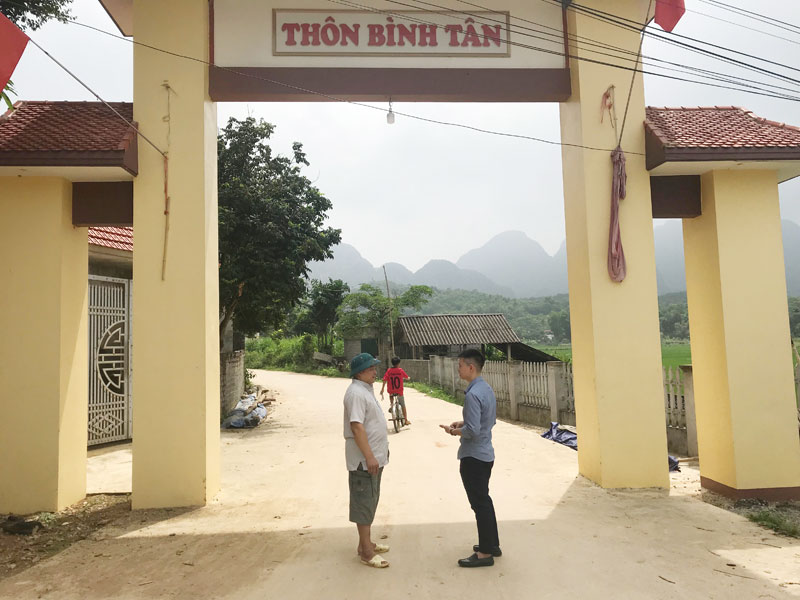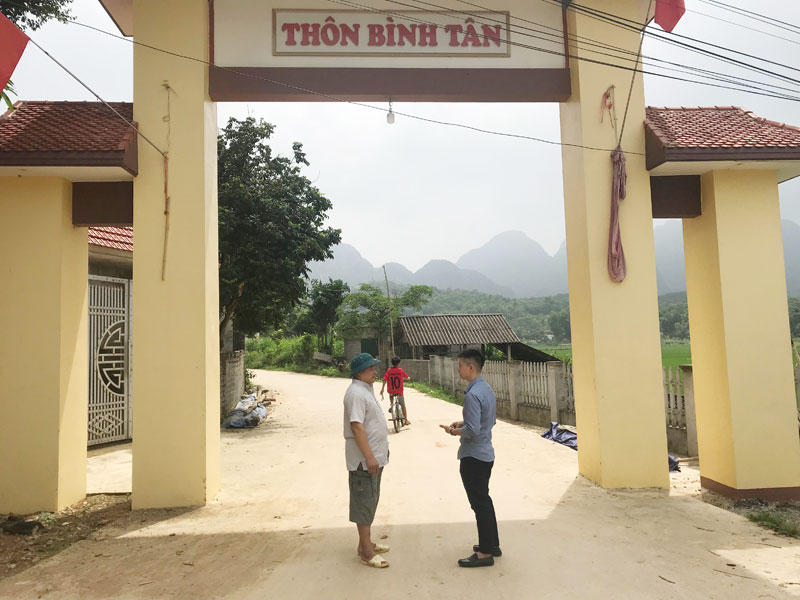
(HBO) – People in Binh Tan hamlet, Nam Thuong commune, Kim Boi district, Hoa Binh province, have joined hands to build concrete roads which are 3.5 – 5m wide, as part of the activities to implement the Party and State’s guidelines on rural transport development. Following the directions of local authorities, people in the hamlet have contributed over 3,000 square metres of land and 3,000 working days to concretise more than 70 percent of rural roads.
 Binh Tan hamlet, Nam Thuong commune, Kim Boi district, has concretised
over 70 percent of rural roads, making it easier for locals to travel.
Binh Tan hamlet, Nam Thuong commune, Kim Boi district, has concretised
over 70 percent of rural roads, making it easier for locals to travel.
Nam Thuong commune is one of the localities in Kim Boi
district to implement effectively the new-style rural building programme,
especially transport development. With the policy of prioritising financial
resources to developing key projects, the commune’s Party Committee and
authorities have decided to focus investment on building and improving transport
system. At present, the commune has concretised 82.4 percent of the roads. For
the outcome, locals have contributed over 7,100 square metres of land for road
construction.
Favourable transport helps the
commune complete other tasks, especially plantation.
Head of Binh Tan hamlet said locals
are willing to contribute land and efforts to build roads because they can see
great benefits from new-style rural building, particularly transport
infrastructure improvement.
With the joint efforts of the people,
roads in Binh Tan hamlet and Nam
Thuong commune have been built to facilitate travelling and mechanisation of
production.
After 10 years, the district has mobilised over 446 billion
VND (19.2 million USD)
to build roads. Local residents have contributed over 12.8 billion VND,
including land and working days.
So far, the district has
concretised 87.3 percent of the inter-communal roads, 73 percent of
inter-village roads, and 79 percent of infield roads, ensuring convenience of
goods transport all year round./.
According to data from the Hoa Binh Provincial Party Committee, the industrial production index for the first six months of 2025 is estimated to have increased by 20% compared to the same period last year. This marks the highest year-on-year growth rate for this period since 2020.
In the first six months of 2025, Hoa Binh province’s export turnover was estimated at 1.145 billion USD, marking an 18.11% increase compared to the same period in 2024. Import turnover was estimated at $ 804 million, a 17.15% increase, which helped the province maintain a positive trade balance.
The lives of the ethnic minority farmers in Tan Lac district have gradually improved thanks to the new directions in agricultural production. This is a testament to the collective strength fostered through the professional associations and groups implemented by various levels of the district’s Farmers’ Union.
With the motto the "product quality comes first,” after nearly one year of establishment and operation, Muong village’s Clean Food Agricultural and Commercial Cooperative, located in Cau Hamlet, Hung Son Commune (Kim Boi district), has launched reputable, high-quality agricultural products to the market that are well-received by consumers. The products such as Muong village’s pork sausage, salt-cured chicken, and salt-cured pork hocks have gradually carved out a place in the market and they are on the path to obtaining the OCOP certification.
In the past, the phrase "bumper harvest, rock-bottom prices" was a familiar refrain for Vietnamese farmers engaged in fragmented, small-scale agriculture. But today, a new spirit is emerging across rural areas of Hoa Binh province - one of collaboration, organisation, and collective economic models that provide a stable foundation for production.
Maintaining growing area codes and packing facility codes in accordance with regulations is a mandatory requirement for agricultural products to be eligible for export. Recently, the Department of Agriculture and Environment of Hoa Binh province has intensified technical supervision of designated farming areas and packing facilities to safeguard the "green passport" that enables its products to access international markets.



 Binh Tan hamlet, Nam Thuong commune, Kim Boi district, has concretised
over 70 percent of rural roads, making it easier for locals to travel.
Binh Tan hamlet, Nam Thuong commune, Kim Boi district, has concretised
over 70 percent of rural roads, making it easier for locals to travel.